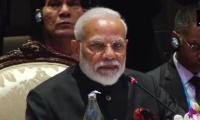Govt Proposes Self-Declaration for Proof of Origin under Customs Law
India's government proposes self-certification for proof of origin under customs law, streamlining FTA duty concessions and promoting ease of doing business.
New Delhi, Jul 24 (PTI) To promote ease of doing business, the government has proposed self-certification with regard to the proof of origin of a product being imported from an FTA nation for seeking duty concessions.
In a free trade agreement (FTA), customs duties on the maximum number of goods traded between two countries are either significantly reduced or eliminated.
At present, to seek these concessions, an importer has to furnish a proof or a 'certificate of origin' of that product from that FTA partner.
"Section 28 DA is being amended to enable the acceptance of different types of proof of origin provided in trade agreements in order to align the said section with new trade agreements, which provide for self-certification," according to the Budget documents.
The document said "proof of origin" means a certificate or declaration issued in accordance with a trade agreement certifying or declaring, as the case may be, that the goods fulfil the country of origin criteria and other requirements specified in an agreement.
An amendment in the Customs Act has been proposed to replace the word "certificate" with "proof".
Think tank GTRI said the FTA tariff preferences can be obtained by the importer submitting either a certificate of origin issued by an agency in the FTA partner country or by self-certification by the exporter.
Each FTA specifies the method is acceptable to importing country Customs.
In this Budget, the customs has amended Section 28DA of the Customs Act. In the amended version the term "proof of origin" will mean both the certificate of origin and self-certification.
Section 28DA of the Customs Act of 1962 deals with the FTAs Rules of Origins and CAROTAR (Customs (Administration of Rules of Origin under Trade Agreements) Rules 2020.
GTRI Founder Ajay Srivastava said these rules seek to ensure that importers provide adequate proof that goods claiming FTA tariff concessions meet all rules of origin criteria. However, in doing so, they impose additional conditions beyond those agreed in the trade pact.
"For example, the FTA text places the responsibility on the certificate issuing authority to verify production details and value addition. However, the CAROTAR Rules require importers to have sufficient information about the regional value content and product-specific criteria specified in the trade agreement," he said.
He added that importers must provide this information as required by the CAROTAR rules or risk losing FTA tariff concessions.
The rules also state that having a certificate of origin from an issuing authority does not relieve importers of the responsibility to exercise reasonable care, he said.
Rajat Bose, Partner, Shardul Amarchand Mangaldas & Co., said the amendment to accept different types of proof of origin is a forward thinking change for ease of doing business.
In a free trade agreement (FTA), customs duties on the maximum number of goods traded between two countries are either significantly reduced or eliminated.
At present, to seek these concessions, an importer has to furnish a proof or a 'certificate of origin' of that product from that FTA partner.
"Section 28 DA is being amended to enable the acceptance of different types of proof of origin provided in trade agreements in order to align the said section with new trade agreements, which provide for self-certification," according to the Budget documents.
The document said "proof of origin" means a certificate or declaration issued in accordance with a trade agreement certifying or declaring, as the case may be, that the goods fulfil the country of origin criteria and other requirements specified in an agreement.
An amendment in the Customs Act has been proposed to replace the word "certificate" with "proof".
Think tank GTRI said the FTA tariff preferences can be obtained by the importer submitting either a certificate of origin issued by an agency in the FTA partner country or by self-certification by the exporter.
Each FTA specifies the method is acceptable to importing country Customs.
In this Budget, the customs has amended Section 28DA of the Customs Act. In the amended version the term "proof of origin" will mean both the certificate of origin and self-certification.
Section 28DA of the Customs Act of 1962 deals with the FTAs Rules of Origins and CAROTAR (Customs (Administration of Rules of Origin under Trade Agreements) Rules 2020.
GTRI Founder Ajay Srivastava said these rules seek to ensure that importers provide adequate proof that goods claiming FTA tariff concessions meet all rules of origin criteria. However, in doing so, they impose additional conditions beyond those agreed in the trade pact.
"For example, the FTA text places the responsibility on the certificate issuing authority to verify production details and value addition. However, the CAROTAR Rules require importers to have sufficient information about the regional value content and product-specific criteria specified in the trade agreement," he said.
He added that importers must provide this information as required by the CAROTAR rules or risk losing FTA tariff concessions.
The rules also state that having a certificate of origin from an issuing authority does not relieve importers of the responsibility to exercise reasonable care, he said.
Rajat Bose, Partner, Shardul Amarchand Mangaldas & Co., said the amendment to accept different types of proof of origin is a forward thinking change for ease of doing business.
You May Like To Read
TODAY'S MOST TRADED COMPANIES
- Company Name
- Price
- Volume
- AvanceTechnologies
- 1.27 (+ 4.96)
- 13080159
- Vodafone-Idea
- 11.23 ( -0.27)
- 4902715
- Welcure-Drugs-and
- 0.45 ( -2.17)
- 4238466
- Ola-Electric-Mobilit
- 35.61 (+ 3.22)
- 2449456
- Meesho-L
- 191.00 (+ 5.93)
- 2242157





